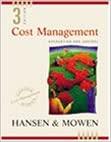Javier Company has sales of $8 million and quality costs of $1,600,000. The company is embarking on
Question:
Javier Company has sales of $8 million and quality costs of $1,600,000. The company is embarking on a major quality improvement program. During the next three years, Javier intends to attack failure costs by increasing its appraisal and prevention costs. The "right"
prevention activities will be selected, and appraisal costs will be reduced according to the results achieved. For the coming year, management is considering six specific activities: qual¬
ity training, process control, product inspection, supplier evaluation, redesign of two major products, and prototype testing. To encourage managers to focus on reducing nonvalueadded quality costs and select the right activities, a bonus pool is established relating to reduction of quality costs. The bonus pool is equal to 10% of the total reduction in quality costs.
Current quality costs and the costs of these six activities are given in the following table.
Each activity is added sequentially so that its effect on the cost categories can be assessed.
For example, after quality training is added, the control costs increase to $320,000 and the failure costs drop to $1,040,000. Even though the activities are presented sequentially, they are totally independent of each other. Thus, only beneficial activities need be selected.

Required:
1. Identify the control activities that should be implemented and calculate the total qual¬
ity costs associated with this selection. Assume that an activity is selected only if it in¬
creases the bonus pool.
2. Given the activities selected in Requirement 1, calculate the following:
(a) the reduction in total quality costs,
(b) the percentage distribution for control and failure costs, and
(c) the amount for this year's bonus pool.
3. Suppose that a quality engineer complained about the gainsharing incentive system.
Basically he argued that the bonus should only be based on reductions of failure and appraisal costs. In this way, investment in prevention activities would be encouraged, and eventually failure and appraisal costs would be eliminated. After eliminating the nonvalue-added costs, focus could then be placed on the level of prevention costs, if this approach were adopted, what activities would be selected? Do you agree with this approach? Explain.
Step by Step Answer:

Cost Management Accounting And Control
ISBN: 9780324002324
3rd Edition
Authors: Don R. Hansen, Maryanne M. Mowen





